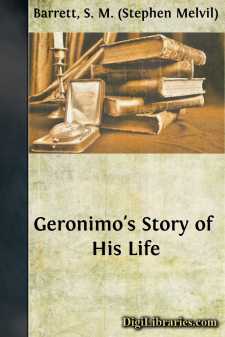Categories
- Antiques & Collectibles 13
- Architecture 36
- Art 48
- Bibles 22
- Biography & Autobiography 813
- Body, Mind & Spirit 142
- Business & Economics 28
- Children's Books 15
- Children's Fiction 12
- Computers 4
- Cooking 94
- Crafts & Hobbies 4
- Drama 346
- Education 46
- Family & Relationships 57
- Fiction 11828
- Games 19
- Gardening 17
- Health & Fitness 34
- History 1377
- House & Home 1
- Humor 147
- Juvenile Fiction 1873
- Juvenile Nonfiction 202
- Language Arts & Disciplines 88
- Law 16
- Literary Collections 686
- Literary Criticism 179
- Mathematics 13
- Medical 41
- Music 40
- Nature 179
- Non-Classifiable 1768
- Performing Arts 7
- Periodicals 1453
- Philosophy 64
- Photography 2
- Poetry 896
- Political Science 203
- Psychology 42
- Reference 154
- Religion 513
- Science 126
- Self-Help 84
- Social Science 81
- Sports & Recreation 34
- Study Aids 3
- Technology & Engineering 59
- Transportation 23
- Travel 463
- True Crime 29
Geronimo's Story of His Life
Description:
Excerpt
INTRODUCTORY
I first met Geronimo in the summer of 1904, when I acted for him as interpreter of English into Spanish, and vice versa, in selling a war bonnet. After that he always had a pleasant word for me when we met, but never entered into a general conversation with me until he learned that I had once been wounded by a Mexican. As soon as he was told of this, he came to see me and expressed freely his opinion of the average Mexican, and his aversion to all Mexicans in general.
I invited him to visit me again, which he did, and upon his invitation, I visited him at his tepee in the Fort Sill Military reservation.
In the summer of 1905 Dr. J. M. Greenwood, superintendent of schools at Kansas City, Missouri, visited me, and I took him to see the chief. Geronimo was quite formal and reserved until Dr. Greenwood said, "I am a friend of General Howard, whom I have heard speak of you." "Come," said Geronimo, and led the way to a shade, had seats brought for us, put on his war bonnet, and served watermelon à l'Apache (cut in big chunks), while he talked freely and cheerfully. When we left he gave us a pressing invitation to visit him again.
In a few days the old chief came to see me and asked about "my father." I said "you mean the old gentleman from Kansas City—he has returned to his home." "He is you father?" said Geronimo. "No," I said, "my father died twenty-five years ago, Dr. Greenwood is only my friend." After a moment's silence the old Indian spoke again, this time in a tone of voice intended to carry conviction, or at least to allow no further discussion. "Your natural father is dead, this man has been your friend and adviser from youth. By adoption he is your father. Tell him he is welcome to come to my home at any time." It was of no use to explain any more, for the old man had determined not to understand my relation to Dr. Greenwood except in accordance with Indian customs, and I let the matter drop.
In the latter part of that summer I asked the old chief to allow me to publish some of the things he had told me, but he objected, saying, however, that if I would pay him, and if the officers in charge did not object, he would tell me the whole story of his life. I immediately called at the fort (Fort Sill) and asked the officer in charge, Lieutenant Purington, for permission to write the life of Geronimo. I was promptly informed that the privilege would not be granted. Lieutenant Purington explained to me the many depredations committed by Geronimo and his warriors, and the enormous cost of subduing the Apaches, adding that the old Apache deserved to be hanged rather than spoiled by so much attention from civilians. A suggestion from me that our government had paid many soldiers and officers to go to Arizona and kill Geronimo and the Apaches, and that they did not seem to know how to do it, did not prove very gratifying to the pride of the regular army officer, and I decided to seek elsewhere for permission. Accordingly I wrote to President Roosevelt that here was an old Indian who had been held a prisoner of war for twenty years and had never been given a chance to tell his side of the story, and asked that Geronimo be granted permission to tell for publication, in his own way, the story of his life, and that he be guaranteed that the publication of his story would not affect unfavorably the Apache prisoners of war....


